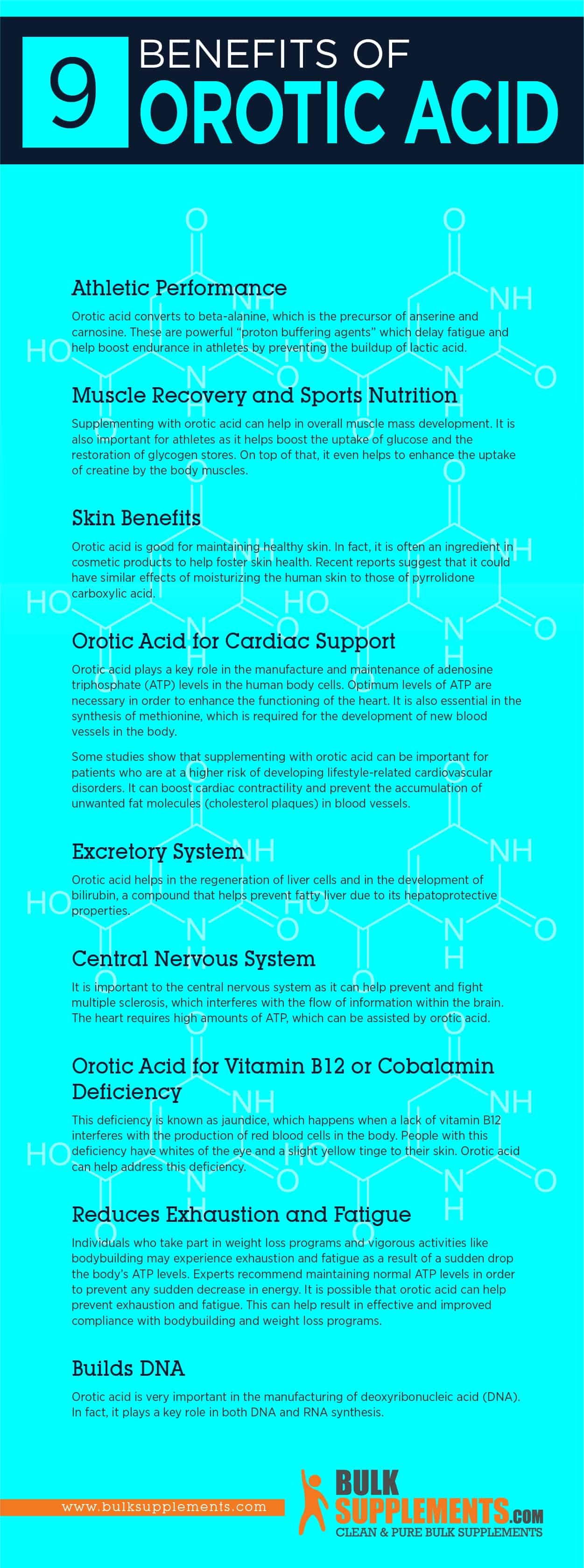Orotic Acid: Benefits, Side Effects & Dosage

Oroctic Acid
What is Orotic Acid?
Orotic acid, also known as pyrimidine carboxylic acid, is a heterocyclic compound. The acid was historically considered to be part of the vitamin B complex and was referred to as vitamin B13, but it was later discovered that it is not, in fact, a vitamin. It was believed to be essential for animal nutrition. Eventually, it was discovered that it could be synthesized by humans. The enzyme dihydroorotate dehydrogenase is responsible for the synthesis of orotic acid.
Orotic acid is essential for the excretory, cardiovascular, immune, muscular and nervous systems. It is also used in some dietary supplements as a mineral carrier. This helps to increase bioavailability. This acid is also important for improving athletic performance and maintaining a healthy skin appearance. Although it offers the body such benefits, it could have side effects like nausea, loss of appetite, mood changes and vomiting.
The richest dietary sources of orotic acid are organ meats like heart and liver, vegetables like carrots and beets, milk and other dairy products. It also comes in the form of a dietary supplement.
Orotic Acid Benefits
Supplementing orotic acid can provide many direct and indirect medicinal and health benefits to the human body. Some of its benefits include:
Athletic Performance
Orotic acid converts to beta-alanine, which is the precursor of anserine and carnosine. These are powerful “proton buffering agents” which delay fatigue and help boost endurance in athletes by preventing the buildup of lactic acid.
Muscle Recovery and Sports Nutrition
Supplementing with orotic acid can help in overall muscle mass development. It is also important for athletes as it helps boost the uptake of glucose and the restoration of glycogen stores. On top of that, it even helps to enhance the uptake of creatine by the body muscles.
Skin Benefits
Orotic acid is good for maintaining healthy skin. In fact, it is often an ingredient in cosmetic products to help foster skin health. Recent reports suggest that it could have similar effects of moisturizing the human skin to those of pyrrolidone carboxylic acid.
Orotic Acid for Cardiac Support
Orotic acid plays a key role in the manufacture and maintenance of adenosine triphosphate (ATP) levels in the human body cells. Optimum levels of ATP are necessary in order to enhance the functioning of the heart. It is also essential in the synthesis of methionine, which is required for the development of new blood vessels in the body.
Some studies show that supplementing with orotic acid can be important for patients who are at a higher risk of developing lifestyle-related cardiovascular disorders. It can boost cardiac contractility and prevent the accumulation of unwanted fat molecules (cholesterol plaques) in blood vessels.
Excretory System
Orotic acid helps in the regeneration of liver cells and in the development of bilirubin, a compound that helps prevent fatty liver due to its hepatoprotective properties.
Central Nervous System
It is important to the central nervous system as it can help prevent and fight multiple sclerosis, which interferes with the flow of information within the brain. The heart requires high amounts of ATP, which can be assisted by orotic acid.
Orotic Acid for Vitamin B12 or Cobalamin Deficiency
This deficiency is known as jaundice, which happens when a lack of vitamin B12 interferes with the production of red blood cells in the body. People with this deficiency have whites of the eye and a slight yellow tinge to their skin. It can help address this deficiency.
Reduces Exhaustion and Fatigue
Individuals who take part in weight loss programs and vigorous activities like bodybuilding may experience exhaustion and fatigue as a result of a sudden drop in the body’s ATP levels. Experts recommend maintaining normal ATP levels in order to prevent any sudden decrease in energy. It is possible that it can help prevent exhaustion and fatigue. This can help result in effective and improved compliance with bodybuilding and weight loss programs.
SEE ALSO

Hibiscus Flower: Benefits, Side Effects & Dosage
Builds DNA
Orotic acid is very important in the manufacturing of deoxyribonucleic acid (DNA). In fact, it plays a key role in both DNA and RNA synthesis.

Orotic Acid Side Effects
Despite the potential benefits of orotic acid there are some possible side effects to keep in mind. Nausea and intestinal upset can occur when taking this supplement. Loss of appetite is also possible. It may have a negative effect on one’s mood. Severe allergic reactions are rare. However, people should seek medical attention if they notice any symptoms of a serious allergic reaction like dermatitis and irritation.
Warnings
Orotic Aciduria
This is a hereditary condition that results from a genetic mistake that can occur in the pyrimide metabolic process. This can cause an accumulation of it in the body and increased detectable levels of it in the urine. Symptoms of orotic aciduria include crystal formation in urine, megaloblastic anemia and potential cognitive and learning difficulties.
Orotic Acid Dosage
Orotic acid is naturally produced in the body in tiny amounts and is considered safe for human consumption. The recommended dietary allowance for orotic acid powder ranges from 500 to 1,000 milligrams daily for adults. It is best to take prior to a workout.
Always consult your medical professional before adding a supplement to your diet.
The Bottom Line
Orotic acid is a good supplement for athletes and people who undertake vigorous exercise activities. It not only lowers fatigue and exhaustion, but also helps in muscle recovery. It even helps with the absorption of beneficial health nutrients like magnesium, calcium and potassium. Just like any other supplement, orotic acid may produce side effects. Be sure to speak to a doctor before adding this supplement to your regimen.



